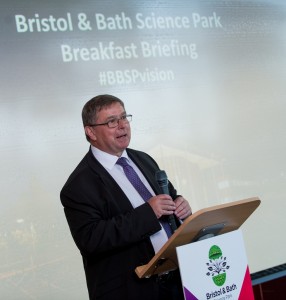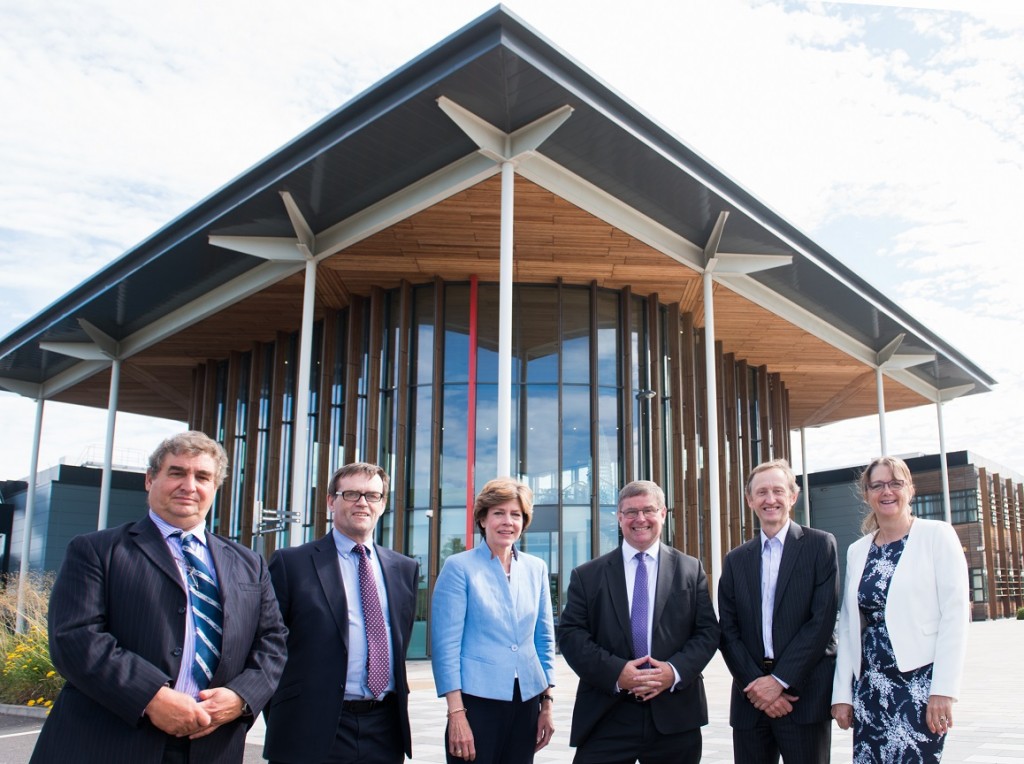Ambitious plans for a new international automotive research facility at Bristol & Bath Science Park were revealed today.
The facility, along with more space for growing businesses and improved training provision for the UK composites sector, were announced by a newly created steering committee set up to deliver phase two of the site’s development.
Proposals put forward by the committee, which is chaired by former Airbus UK boss Prof Iain Gray, pictured, include:
· The development of a second ‘grow-on space’ to provide office accommodation, workshop and laboratory space for growing businesses.
· An open innovation centre led by the University of Bath combining talent from academia and industry to work on world-leading advanced propulsion systems for the automotive sector.
· A major industry-led collaboration to create a centre of national and international significance, involving the universities of Bristol, Bath and West of England and supporting the development of emerging technologies.
· The further extension of the National Composites Centre (NCC) to include a skills facility which would firmly establish it as an international centre of excellence in the research, development and commercialisation of composite technologies and products.
· Building on the success of the NCC’s business model to develop further bespoke plots for businesses.
Prof Gray told more than 70 business, government and university delegates at this morning’s event that the Science Park will play a key role in supporting the West of England’s economy by helping it capitalise on high-growth new industries.
He said: “The Science Park is a vital component in the production line for developing new sectors where the West of England is already establishing a leadership position – from robotics to quantum computing technologies.
“These fast-emerging industries will be key to job creation and inward investment in the Emersons Green Enterprise Area and the wider area, building on the West of England’s reputation as a major centre for science, technology and engineering.”
The former Airbus UK managing director and chief executive of the UK’s innovation agency Innovative UK (formerly the Technology Strategy Board) addressed delegates alongside Alison Starr, NCC executive director for strategy and business, and Steve Egan, vice-president (implementation) at the University of Bath.
Since opening in 2011, the Science Park has attracted more than 40 tenants, helping create 350 jobs. One of the park’s success stories has been the NCC, part of the Government’s High Value Manufacturing initiative. Within four years it has become internationally renowned and a national asset for world-class innovation in the design and manufacture of composites with applications in sectors spanning aerospace, automotive and heavy infrastructure. During the last year alone it worked with more than 100 companies on research and technology development projects at the centre.
Prof Gray added: “Bristol and Bath Science Park has a critical role to play as the central link between university-led research for the development of technologies, the commercialisation of ideas and the creation of new industries. That’s why it’s so important for the wider science and technology community to come together and make it happen.
“The Science Park has made a fantastic contribution to the local economy in the last four years and it is an exciting time to be connected with this project. I look forward to working with the park and members of the steering committee on the next phase of development.”
Thornbury and Yate MP Luke Hall added: “The advancement of the science and technology sector and supporting high-growth businesses are integral to the Government’s growth plans. Science parks like the one we have in Bristol and Bath have a vital role to play in helping to meet our ambitions. Today’s event marks an important step in the future development of the Science Park, which has helped create hundreds of highly skilled jobs and support the development of the businesses that we will be talking about in the future.
“Key to its ongoing success is excellent transport links and this week we have held discussions in Parliament about our intention to bring further investment to South Gloucestershire to introduce a much-needed second junction on the M4 near the site to support and accommodate further growth within the area.”
Steve Egan said the University of Bath’s proposals for a new centre would build on links with the NCC and contribute to the Government’s Propulsion Nation vision, which aims to deliver world-leading technologies as part of its strategy to support the automotive sector.
He said: “We are committed to the development of an applied and collaborative research facility to deliver transformational research and development for tomorrow’s clean efficient vehicles including electric, hybrid and alternatively fuelled cars. The Institute for Advanced Automotive Propulsion Systems would build on the achievements of our highly regarded Powertrain and Vehicle research centre and exploit synergies at the Science Park with the NCC.
“Working as an open innovation centre the institute will enable the UK to exploit new ideas from across the globe. Its world-leading facilities and highly trained staff will attract new industry and new jobs to the South West. The institute will work closely with industry including multinationals and SMEs to enhance the UK’s competitive edge.
“The university is already preparing the business case needed to attract funding and ensure the project delivers on its undoubted potential. We are encouraged by the Government’s support for manufacturing and for the automotive industry in particular and will play our part in ensuring the UK secures a leading global position.
Alison Starr said: “The success of the NCC has exceeded initial expectations, which can in part be attributed to its location at the Bristol and Bath Science Park.
“Here we can utilise our capability, working in collaboration with industrial partners, to facilitate the journey from an idea to commercialisation. We are able to draw on a strong network of academic expertise and bring new and exciting ideas to industrial application. The NCC is currently developing training courses to address national shortages of skilled workers in this emerging technology.”
Pictured: Steering committee members Adam Ward (Quantumstrategic asset director), Prof Steve Egan (University of Bath), Bonnie Dean (Science Park chief executive), Prof Iain Gray (chair), Jon Ashcroft (Quantum) and Alison Starr (NCC executive director for strategy and business). Photos by JonCraig.co.uk































